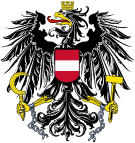Ministry of Foreign Affairs (Austria)
You can help expand this article with text translated from the corresponding article in German. (July 2022) Click [show] for important translation instructions.
|
| Bundesministerium für europäische und internationale Angelegenheiten | ||
Minister responsible | ||
| Agency executive |
| |
|---|---|---|
| Website | www | |
| This article is part of a series on the |
| Politics of Austria |
|---|
 |
The Ministry of Foreign Affairs (
Competencies

On 1 March 2007 the former Federal Ministry for External Affairs (Bundesministerium für auswärtige Angelegenheiten, BMaA) was renamed "Federal Ministry for European and International Affairs" which, as of 1 March 2014, changed to "Federal Ministry for Europe, Integration and Foreign Affairs". It is responsible for a variety of matters concerning Austria's foreign policy and relations, including matters of
The ministry is also concerned with economic integration, European Union law, the Austrian relations to Central and Eastern Europe and the Commonwealth of Independent States (CIS), as well as development aid. It is responsible for matters of the International Atomic Energy Agency with its seat in Vienna, the United Nations High Commissioner for Refugees and the International Red Cross. The Diplomatic Academy of Vienna, formerly part of the ministry, since 1996 forms an autonomous organisation.
History
The history of international diplomacy is closely connected to Vienna. Diplomats were for the first time classified as such at the Congress of Vienna in 1815. Furthermore, the United Nations' conferences which led to the Vienna Convention on Diplomatic Relations (1961) and the Vienna Convention on Consular Relations (1963) were both held in Austria's capital city.
The year 1720 is considered to be the origin of an independent Austrian diplomatic service, which was when Emperor
After World War I and the break-up of the Austro-Hungarian monarchy, foreign affairs were attended to by the Federal Chancellery. It was not before 1959 that a separate Federal Ministry for Foreign Affairs (German: Bundesministerium für auswärtige Angelegenheiten or BMaA) was established.
With the government under Federal Chancellor Alfred Gusenbauer, the former BMaA was renamed "Federal Ministry for European and International Affairs" in 2007 to better reflect and express "the interconnection, networking, partnership and solidarity characterising Austria's international relations", as former Foreign Minister Ursula Plassnik put it. The old name had "rather conveyed the additional nuance of a demarcation".
As part of the amendment to the Federal Ministries Act and the swearing-in of Sebastian Kurz as Foreign Minister on 16 December 2013, the responsibilities of the former State Secretariat for Integration were transferred to the Foreign Ministry. Effective March 1, 2014, it was therefore renamed "Federal Ministry for Europe, Integration and Foreign Affairs". On 29 January 2020, it was renamed "Federal Ministry for European and International Affairs".[2]
List of Austrian Foreign Ministers
References
- ^ "Bundesfinanzgesetz 2019" (PDF).
- ^ Bundesministeriengesetz-Novelle 2020 (BGBl. I 8/2020) (in German). 28 January 2020. Retrieved 29 January 2020.
External links
![]() Media related to Federal Ministry for European and International Affairs at Wikimedia Commons
Media related to Federal Ministry for European and International Affairs at Wikimedia Commons



